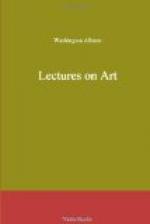It pleased our Creator, when he endowed us with appetites and functions by which to sustain the economy of life, at the same time to annex to their exercise a sense of pleasure; hence our daily food, and the daily alternation of repose and action, are no less grateful than imperative. That life may be sustained, and most of its functions performed, without any coincident enjoyment, is certainly possible. Our food may be distasteful, action painful, and rest unrefreshing; and yet we may eat, and exercise, and sleep, nay, live thus for years. But this is not our natural condition, and we call it disease. Were man a mere animal, the very act of living, in his natural or healthy state, would be to him a continuous enjoyment. But he is also a moral and an intellectual being; and, in like manner, is the healthful condition of these, the nobler parts of his nature, attended with something more than a consciousness of the mere process of existence. To the exercise of his intellectual faculties and moral attributes the same benevolent law has superadded a sense of pleasure,—of a kind, too, in the same degree transcending the highest bodily sensation, as must that which is immortal transcend the perishable. It is not for us to ask why it is so; much less, because it squares not with the poor notion of material usefulness, to call in question a fact that announces a nature to which the senses are but passing ministers. Let us rather receive this ennobling law, at least without misgiving, lest in our sensuous wisdom we exchange an enduring gift for a transient gratification.
Of the peculiar fruits of this law, which we shall here distinguish by the general term mental pleasures, it is our purpose to treat in the present discourse.
It is with no assumed diffidence that we venture on this subject; for, though we shall offer nothing not believed to be true, we are but too sensible how small a portion of truth it is in our power to present. But, were it far greater, and the present writer of a much higher order of intellect, there would still be sufficient cause for humility in view of those impassable bounds that have ever met every self-questioning of the mind.
But whilst the narrowness of human knowledge may well preclude all self-exaltation, it would be worse than folly to hold as naught the many important truths which have been wrought out for us by the mighty intellects of the past. If they have left us nothing for vainglory, they have left us at least enough to be grateful for. Nor is it a little, that they have taught us to look into those mysterious chambers of our being,—the abode of the spirit; and not a little, indeed, if what we are there permitted to know shall have brought with it the conviction, that we are not abandoned to a blind empiricism, to waste life in guesses, and to guess at last that we have all our lives been guessing wrong,—but, unapproachable though it be to the subordinate Understanding,




